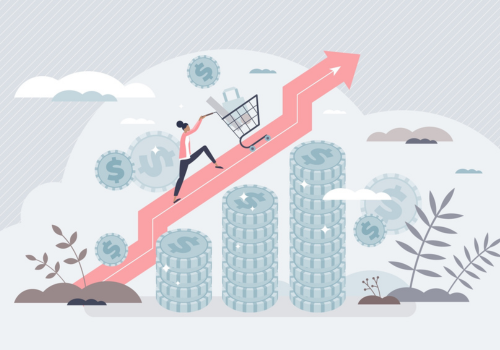El GDP explicado: una guía completa para principiantes

Have you ever wondered what the term GDP really means? It's one of the most important economic indicators out there, and understanding it is crucial for anyone looking to make sense of the economy. In this comprehensive guide, we'll break down the components of GDP, explain its impact on the economy, and give you the tools you need to make sense of this crucial metric. Whether you're a student, investor, or just someone curious about the world around you, this guide on GDP is the perfect place to start.
What is GDP?
GDP stands for Gross Domestic Product and it's a way to measure the size of a country's economy. Simply put, it's the total value of all goods and services produced within a country in a given period of time, usually a year. Think of it as a scoreboard for the economy, measuring how much stuff is being made and sold.
A high GDP usually means a strong economy, while a low GDP can indicate economic weakness.
Understanding it is important because it helps governments, businesses, and investors make decisions about how to allocate resources and plan for the future.
How is GDP growth rate calculated?
Calculating the GDP growth rate involves measuring the increase or decrease in the size of a country's economy over a certain period of time, usually a year or a quarter. There are three main ways to calculate it: the income approach, the expenditure approach, and the productivity approach.
The income approach
The income approach measures the total income earned by individuals and businesses within a country during a given period of time. This includes wages, profits, and rents. The GDP is calculated by adding up all of these incomes.

The expenditure approach
The expenditure approach measures the total amount of spending on goods and services within a country during a given period of time. This approach includes all types of spending, including consumption, investment, government spending, and net exports.

The productivity approach
The productivity approach, also known as the value-added approach, measures the value added by each sector of the economy during the production process. This approach focuses on the value that each sector adds to the final product, rather than simply adding up all the incomes or expenditures.

What does expenditure GDP consist of?
The formula for calculating GDP using the expenditure approach is:
GDP = Consumption (C) + Investment (I) + Government Spending (G) + Net Exports (NX)
Where:
- Consumption includes all spending by households on goods and services, such as food, housing, and healthcare.
- Investment includes spending by businesses on capital goods, such as machinery and equipment, as well as spending on new construction and inventory.
- Government spending includes all spending by the government, including salaries, purchases of goods and services, and investments in infrastructure.
- Net exports are the difference between exports (goods and services produced in the country and sold to other countries) and imports (goods and services produced in other countries and sold in the country).
By adding up all of these expenditures, economists can estimate the total value of all goods and services produced within a country during the given period of time.
How does GDP affect the economy?
It can have a significant impact on the economy in several ways:
- It affects employment
- When the GDP is growing, businesses tend to expand, and this often leads to an increase in job opportunities. A higher GDP indicates that the economy is producing more goods and services, which can create more jobs and reduce unemployment.
- It affects government revenue
- The government's revenue is largely dependent on the country's GDP. When the GDP is growing, tax revenue tends to increase, which can lead to more government spending on social welfare programs, infrastructure, and other projects.
- It affects consumer confidence
- A strong GDP can lead to increased consumer confidence, as people tend to feel more optimistic about the future of the economy when it is growing. This can lead to higher levels of consumer spending, which can drive economic growth even further.
- It affects international trade
- A country's GDP can affect its ability to compete in international trade. A higher GDP can make a country more attractive to foreign investors and can lead to increased exports, which can boost the economy further.
¿Cuál es su estilo de trading?
No importa la circunstancia, conocer tu estilo de trading es el primer paso para el éxito.

What affects GDP?
Three of the main factors that can impact GDP are: Population, Foreign Direct Investment (FDI), and Inflation. Here's a brief explanation of each:
Population
Population growth can have a significant impact on a country's GDP. A growing population can lead to increased consumer spending, higher demand for goods and services, and increased investment in infrastructure and other projects. However, population growth can also put a strain on resources, such as land, water, and energy, which can negatively impact the GDP.

Foreign Direct Investment (FDI)
FDI occurs when a company from one country invests in another country. FDI can have a positive impact on a country's GDP, as it can lead to increased investment, job creation, and economic growth. However, FDI can also have negative effects, such as exploitation of natural resources, labor, or the environment.

Inflation
Inflation refers to the rate at which the general level of prices for goods and services is increasing. Inflation can impact GDP in several ways. If inflation is too high, it can lead to decreased consumer spending, as people are less likely to buy goods and services when prices are rising rapidly. Additionally, inflation can impact the cost of borrowing, which can impact investment and economic growth.

Limitations of GDP:
- It only measures economic activity and does not take into account non-economic factors such as environmental quality, social welfare, and income distribution.
- It does not reflect the informal economy, which can be significant in some countries.
- It does not account for income inequality, and it is possible for a country to have a high GDP but a large proportion of the population living in poverty.
- It does not consider the value of unpaid work, such as caring for children or elderly family members.
Other economic indicators of GDP include:
- Gross National Product (GNP)
- Human Development Index (HDI)
- Consumer Price Index (CPI)
- Purchasing Managers' Index (PMI)
- Unemployment rate
- Balance of trade
- National debt
- Inflation rate
- Poverty rate
- Quality of life indices

Summary
GDP is not just a number but a reflection of a country's economic activity and performance. As we have seen, it can be calculated through different approaches, each shedding light on different aspects of the economy. By understanding how it is calculated and the factors that affect it, we can better comprehend the complexities of our global economy.
No es un consejo de inversión. El rendimiento pasado no es indicativo de resultados futuros.










